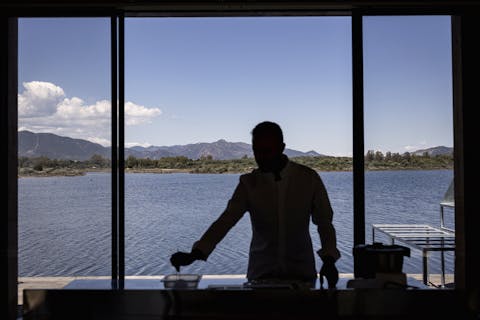Fradis Minoris: a haven of sustainability and innovative cuisine in the Nora Lagoon | Olianas
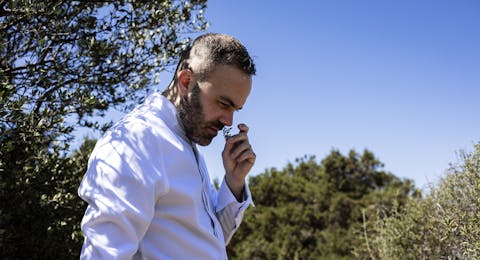
Gastronomy
Fradis Minoris: a haven of sustainability and innovative cuisine in the Nora Lagoon
by Jessica Cani
Fradis Minoris is much more than just a restaurant. Born of the vision of two biologists, Daniela Fadda and Giuseppe Ollano, it is the beating heart of an extensive ecosystem, a bona fide workshop of biodiversity and sustainability. Today, alongside the restaurant and brand-new bistrot, the project includes a natural park with an eco-education center and a cetacean and sea turtle recovery facility.
We visited it on an evening in mid-June; between one dish and another, lulled by the place’s unique atmosphere, we were told by chef Francesco Stara and his team what Fradis Minoris is all about.
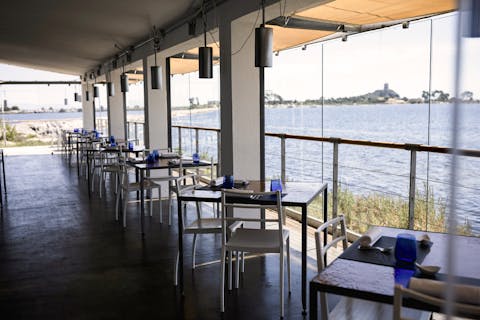
This is our third appointment with the Vite column and, as always, we let our host set the scene with a glass of wine. Stara chooses to stay in Sardinia: “I suggest a refermented wine,” he says. “It’s summer, and I find these very pleasant, light, drinkable, perfect to start an evening. I think we should start our chat with a refermented Vermentino.” This time, however, our get-together is in the dining room of a restaurant with a red and a green Michelin star, so we really do sample a glass recommended by Ilaria Rimessi, the sommelier who will escort us through dinner: a wonderful Nasco.
It’s Sunday, and thanks to the energy of the sea and nearby archeological site, the air we breathe walking along the isthmus that takes us to Fradis Minoris is calm, light, and invigorating.
The philosophy that drives this place is based on a harmonious coexistence between human activity and nature. Here, they fish using traditional and sustainable practices, respecting natural cycles and marine biodiversity. The menu is a tribute to the local area, with dishes that change often depending on the catch-of-the-day and wild lagoon greens
As biologist Andrea Orrù, who was there to greet us when we arrived, tells us, the Nora Lagoon Project was born in 1985 with the aim of turning this area into a multipurpose educational environment integrating naturalistic, historical, and economic values. Today, it has six members, including four biologists, an agricultural surveyor, and a fisherman. Over time, it has developed environmental education programs, a museum, and a cetacean and sea turtle recovery center. The members’ work focuses on educating people to respect the environment, with special emphasis on marine culture, by providing multidisciplinary experiences that stimulate thought on environmental interactions and promote a sense of individual responsibility towards this area.
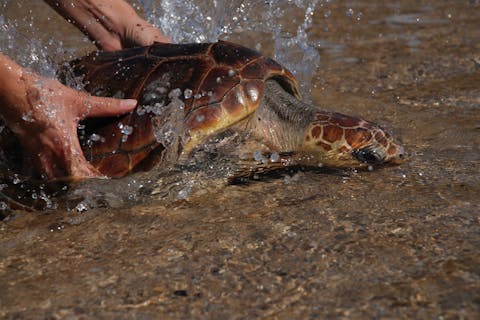
Recent projects include the FradisLAB, which opened in July 2024 and complements the restaurant, and the oyster farm. “We started on July 21, 2020, and spent the first two years figuring out whether the lagoon lent itself to oyster farming,” says Andrea Orrù. “The results achieved were satisfactory for the conch oyster (imported to Europe in 1978) because we have a growth rate of 9 months. We also experimented with the flat oyster, endemic to the Mediterranean: it typically grows in two years, but here takes just a little over a year and a half. This allowed us to realize that oyster farming is feasible here.
We have 3,000 fertile flat oysters and the first one thousand oysters scattered throughout the lagoon. The next project will be adding more poles, to create a substrate so that the veliger, i.e., the stage in which the oyster is in its larval form, can settle and reproduce by repopulating the place. This job calls for a lot of care: flat oysters are becoming increasingly rare because they are particularly sensitive to temperature change.”
Each element that makes up Fradis Minoris is the result of long-term planning; the aim is to enhance and preserve the area that developed in the 4th century B.C., under the Punic people, and was conquered by the Romans in 238 B.C.
History, biology, and gastronomy are the cultural elements that embrace this place.
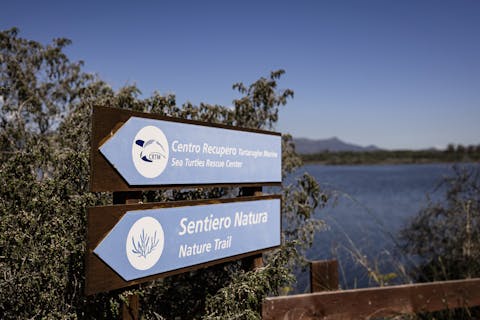
Every feature and facet of the restaurant, from the eco-friendly furnishings to the handling of resources, expresses a commitment to sustainability. But what makes Fradis Minoris truly unique is its ability to offer an immersive experience in the nature and culture of the place. Here, visitors enjoy a sensory journey that starts with a walk to discover the sea and the lagoon and climaxes with a gastronomic experience that tells the story of Sardinia.
Chef Francesco Stara is writing a new chapter of Sardinia's gastronomic history. With a vision that embraces past and present, he is steering the restaurant toward a culinary footprint that is ever more rooted in the land, yet has an open outlook on the world.
At a time when sustainability is in danger of becoming a slogan, or an attempt at greenwashing, Fradis Minoris is a tangible example of how culinary excellence, respect for the environment, and enhancement of the territory can be combined. The restaurant’s cuisine proves that true innovation isn’t only in the techniques or ingredients, it’s in the ability to create a dialogue between man and nature.
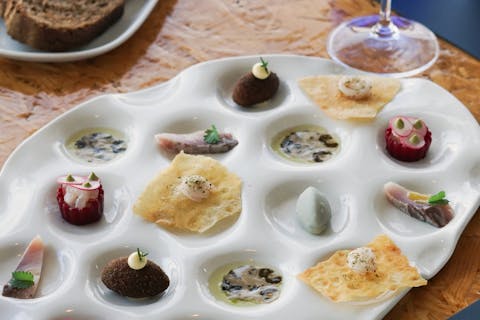
The path taken by Fradis Minoris spans the flavors of the Mediterranean, starting, of course, with a spotlight on Sardinia. Stara invites patrons to explore the island's gastronomic roots by rediscovering time-honored culinary practices and reinterpreting them in a contemporary key. This research and development process leads to a full immersion into the Mediterranean gastronomic heritage, which is world-renowned for its nutritional balance and richness of flavors.
“In developing our menu, we’re focusing more and more on the Mediterranean,” says Stara. “A flavor that can identify a geographical area, which perhaps has a certain microclimate or an area celebrated for the excellence of its products, and the possibility of creating a balanced diet from them. It’s a modern, contemporary cultural issue, that allows us to create a balance between taste and nutrition.” We might say that here customers do not just enjoy a dining experience, they also have a chance to experiment with a nutrition-related gastronomic sense focused on the importance of eating a certain way.
Stara's culinary philosophy is based on a deep respect for local ingredients enhanced by freshness and quality. So, for example, a dinner can start with an infusion of dehydrated posidonia leaves and bread served with fish gonad sheep butter, followed by a dish narrated by Gabriele Galletta which recalls a painter's palette and contains a variety of amuse bouches that portray the sea and the lagoon, for instance, lagoon fish liver bonbons, smoked mullet fillet, fish head croquettes, and guttiau bread with deep-sea amberjack lard.
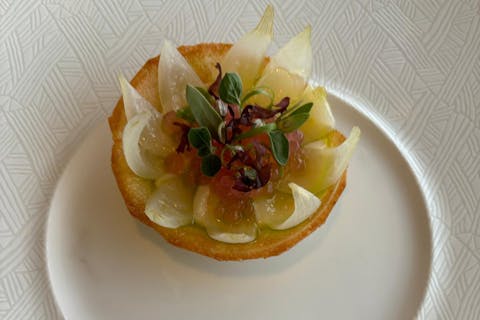
The Fradis Minoris menu honors Sardinian biodiversity and focuses on choice locally produced gourmand specialties such as Slow Food Presidium Escalapiano Axridda, a sheep cheese matured in a clay coating, and Sa Laurera pulses, which are grown using dryland farming techniques. These ingredients are more than just symbols of the local land: they bear witness to sustainable and environment-friendly farming.
However, Stara's approach is by no means confined solely within the geographical limits of the island. It also draws on the culinary influences of the neighboring and nearby Mediterranean countries, creating a gastronomic dialogue that embraces seemingly different places, lands that, in fact, centuries of travel and migrations have made more alike than we realize. “I have a lovely relationship with Spain, with some parts of the Middle East, such as Lebanon and Palestine, and I'm studying the countries around us. We have a lot of products in common; plus, over the centuries Sardinia was conquered by many different cultures, so I easily find connections. This is truly inspiring”.
Stara’s Passiu rice cooked in water with shellfish, squid ink, and fish garum is an excellent example. Its presentation, restaurant manager Gianluca Buttarelli tells us, is a combination inspired by Italian-style riso al salto and Middle Eastern Maqloubeh, a layered dish typical of Palestine and Jordan. Fradis Minoris’ signature dish is seasoned with tahina, sumac, thyme, and olive oil. Underneath, there’s an emulsion made with brown stock and seared squid. Lemon juice, added at the end, lends a distinctive Mediterranean note.
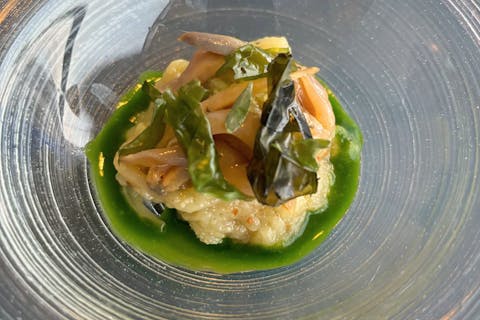
Every facet of Fradis Minoris’ cuisine expresses the restaurant’s commitment to sustainability and respect for the environment. The environmental dimension is at the core of Stara’s philosophy, an approach that translates into a meticulous selection of ingredients and a constant search for sustainable practices. It’s an ever-evolving cuisine driven by unrelenting curiosity and eagerness to experiment. In this context, the role of the chef merges with that of a custodian of a gastronomic heritage in constant progress, of a tradition that becomes the future, and of a cross-pollination that draws on the closest territorial identity.
Every dish tells a story, and today, the restaurant also boasts “a younger sibling” next to it: FradisLab, an open-kitchen lagoon-view bistrot, tapas bar, and gastronomic fusion lab.
We leave Fradis Minoris aware that Sardinia has a wealth of people, of lives (Vite!), who, like us, work hard every day to contribute to the constant improvement of our territory. As is our custom, we end our conversation with Stara asking him where he would recommend we have a meal, that is to say, where he likes to go. He suggests two of his favorites: “Close to home, I’d recommend Manuele Senis’ Mema Restaurant, in Pula. A simple place with fabulous seasonal, no-frills, local cuisine. I go there whenever I can. In Cagliari, on the other hand, I enjoy going to Sabores. It’s got the perfect vibes, the ones I seek, between great service and culinary options. We have a lot of fun there, it’s also an ideal place for a meal with my daughter.”
